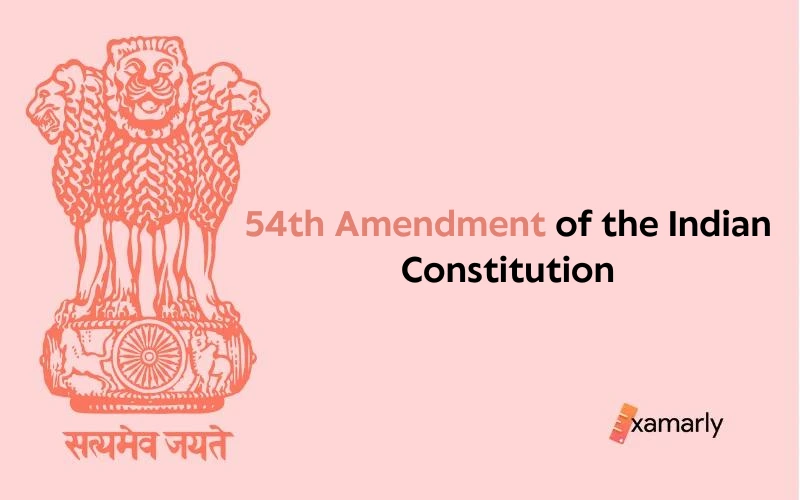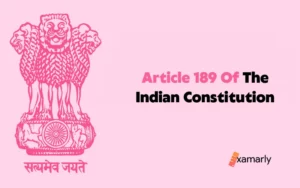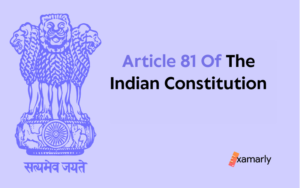The 54th amendment of the Indian constitution has made some important changes. It increased the salary of India’s Chief Justice and other Judges and provided for determining future increases without the need for a constitutional amendment.
Let us learn in detail about the 54th amendment to the Indian constitution and the constitutional amendment procedure involved in it. We have curated this blog exclusively for the UPSC exam preparation.
- 54th Amendment Of the Indian Constitution
- Objects And Reasons
- Major Provision
- Conclusion
- Frequently Asked Questions
- What is the 54th Amendment of the Indian Constitution?
- When was the 54th Amendment of the Indian Constitution passed?
- Who introduced the 54th Amendment of the Indian Constitution?
- How many seats were reserved for SCs and STs in the Lok Sabha and state assemblies after the 54th Amendment of the Indian Constitution?
- Was the 54th Amendment of the Indian Constitution a part of the Mandal Commission recommendations?
- Was the 54th Amendment of the Indian Constitution challenged in any court?
- How does the 54th Amendment of the Indian Constitution ensure the representation of SCs and STs in the Lok Sabha and state assemblies?
- Can the reservation for SCs and STs in the Lok Sabha and state assemblies be increased beyond the limit set by the 54th Amendment of the Indian Constitution?
- Was the 54th Amendment of the Indian Constitution amended or repealed?
- How does the 54th Amendment of the Indian Constitution promote social justice?
54th Amendment Of the Indian Constitution
The 54th Amendment to the Indian Constitution was enforced on 1st April 1986.
The comprehensive amendment was made to increase the salary of the respected Chief Justice of India and other Judges and to determine future increases without the need for a constitutional amendment.
It happened when Rajiv Gandhi was in power in the central government.
Objects And Reasons
The Constitution (Fifty-fourth Amendment) Bill’s statement of aims and justifications is included below.
- The provisions of Part D of the Second Schedule to the Indian Constitution regulate the remuneration of judges of the Supreme Court and High Courts in the manners listed below: Chief Justice of India – monthly salary of Rs. 5,000 Supreme Court judges make Rs. 4,000 each month. Chief Justice of a High Court; monthly salary of Rs.4000High Court judges makes Rs. 3,500 per month.
- Despite significant inflation and price increases that have occurred since 1950, their incomes have not changed. The Conference, comprising Chief Justices, Chief Ministers, and Law Ministers of the States, convened on August 31 and September 1, 1985. The participants deliberated on various issues, including the enhancement of service conditions for judges. One of the recommendations was to increase their salaries to alleviate the impact of inflation and attract the top talent in the nation to occupy judicial roles.
- After carefully weighing all the relevant factors, it is suggested that the Judges’ salaries be raised as follows: Chief Justice of India – Rs. 10,000 per monthJudges of the Supreme Court -Rs. 9,000 per monthChief Justice of a High Court – Rs. 9,000 per monthJudges of a High Court – Rs. 8,000 per month
- The Statement of Objects and Reasons appended to the Constitution (Fifty-fourth Amendment) Bill, 1986 noted that the salaries of judges had remained unchanged since 1950, despite inflationary pressures and rising prices. The Bill proposed increasing the salaries of judges in the following categories: Chief Justice of India, Judges of the Supreme Court, Chief Justice of a High Court, and Judges of a High Court.
Also Read: Tricks To Remember Amendments Of Indian Constitution
Major Provision
The 54th amendment of the Indian Constitution takes retrospective effect from April 1, 1986. This amendment not only amended the second schedule of the Indian Constitution but also amended articles 125 and 221 as well.
Articles 221 and 125 within the Constitution have been amended with adequate provisions to provide that the Judges of the top court, i.e. the Supreme Court and the High Court shall be paid such salaries as decided by Parliament by law.
The Constitution (Fifty-fourth Amendment) Act, 1986 substituted Clause (1) of Article 125 and Clause (1) of Article 221 to enable the determination of judges’ salaries by Parliament by law.
The Act also amended Part D of the Second Schedule to the Constitution to increase the salaries of judges in the Supreme Court and High Courts, as detailed in the Statement of Objects and Reasons appended to the Bill.
Similar Posts:
- 69th Amendment of the Indian Constitution
- 101st Amendment of the Indian Constitution
- 40th Amendment of the Indian Constitution
Amendment of Article 221
Article 221 – In Article 221, judges of each High Court in India would receive salaries as specified in Part D of the Second Schedule of the Constitution unless otherwise determined by a law passed by Parliament.
The amendment to Article 221 introduced a change that enabled Parliament to determine the salaries of High Court judges by law.
The amendment meant that until Parliament made provisions for determining the salaries of judges, the salaries would continue to be as specified in Part D of the Second Schedule of the Constitution.
This change was made to enable the government to increase the salaries of judges, which had remained the same since 1950, despite inflation and price rise over the years.
And until special provision is so made on that behalf, they shall be paid such salaries as mentioned in the Second Schedule. (Sections 2 &3)
Amendment of Article 125
The Constitution (Fifty-fourth Amendment) Act, 1986 amended Article 125 of the Indian Constitution. Before the amendment, Article 125(1) stated that the Judges of the Supreme Court would be paid salaries as determined by the President.
However, after the amendment, Clause (1) of Article 125 was substituted, and it now provides that the salaries of Supreme Court Judges will be determined by Parliament through the law.
Until such a law is enacted, the salaries of Supreme Court Judges will be the same as specified in the Second Schedule of the Constitution.
This amendment essentially gives Parliament the power to determine the salaries of Supreme Court Judges through legislation, rather than leaving it to the discretion of the President.
54th amendment amends the Second Schedule of the Constitution to enhance the salary of the Chief Justice of India from Rs. 5,000 to Rs. 10,000 per month, that of other Judges of the highest court.
The Supreme Court and Chief Justices of the High Courts from Rs. 4,000 to Rs. 9,00 per month and that of the Judges of the High Courts from Rs. 3,500 to Rs. 8,000, monthly. These were the constitutional provisions of the 54th amendment.
Conclusion
Amendments to the Indian constitution have frequently helped in situations of conflict. Hence various modifications have helped regain the power of democracy and the authenticity of the constitution from time to time.
The 54th amendment of the Indian Constitution is of significant amendments as well. It permitted future pay rises without requiring a constitutional revision and raised the salaries of India’s Chief Justice and other judges.
Frequently Asked Questions
What is the 54th Amendment of the Indian Constitution?
The 54th Amendment of the Indian Constitution is related to the reservation of seats for Scheduled Castes and Scheduled Tribes in the Lok Sabha and the state assemblies.
When was the 54th Amendment of the Indian Constitution passed?
The 54th Amendment of the Indian Constitution was passed in 1986.
Who introduced the 54th Amendment of the Indian Constitution?
The 54th Amendment of the Indian Constitution was introduced by the then Prime Minister of India, Rajiv Gandhi.
How many seats were reserved for SCs and STs in the Lok Sabha and state assemblies after the 54th Amendment of the Indian Constitution?
After the 54th Amendment of the Indian Constitution, seats were reserved for Scheduled Castes and Scheduled Tribes in the Lok Sabha and state assemblies.
Was the 54th Amendment of the Indian Constitution a part of the Mandal Commission recommendations?
No, the 54th Amendment of the Indian Constitution was not a part of the Mandal Commission recommendations.
Was the 54th Amendment of the Indian Constitution challenged in any court?
Yes, the 54th Amendment of the Indian Constitution was challenged in the Supreme Court of India, but it was upheld.
How does the 54th Amendment of the Indian Constitution ensure the representation of SCs and STs in the Lok Sabha and state assemblies?
The 54th Amendment of the Indian Constitution ensures the representation of SCs and STs in the Lok Sabha and state assemblies by reserving seats for them.
Can the reservation for SCs and STs in the Lok Sabha and state assemblies be increased beyond the limit set by the 54th Amendment of the Indian Constitution?
No, the reservation for SCs and STs in the Lok Sabha and state assemblies cannot be increased beyond the limit set by the 54th Amendment of the Indian Constitution.
Was the 54th Amendment of the Indian Constitution amended or repealed?
No, the 54th Amendment of the Indian Constitution has not been amended or repealed.
How does the 54th Amendment of the Indian Constitution promote social justice?
The 54th Amendment of the Indian Constitution promotes social justice by providing representation to the marginalized sections of the society, i.e., the Scheduled Castes and Scheduled Tribes, in the Lok Sabha and state assemblies.






